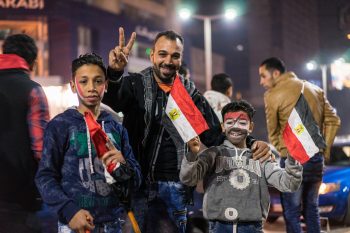Untranslatable Phrases in Colloquial Egyptian Arabic: The Egyptian Man (Part 2) Posted by Hanan Ben Nafa on May 3, 2017 in Culture, Vocabulary
Welcome to the second part of this blog that I’m dedicating to talk about some culturally untranslatable phrases found in colloquial Egyptian Arabic. Learning about these phrases are both linguistically and culturally interesting. This is because the language used is very formulaic and does not necessarily follow rules of the Arabic language you learn in class. It can also give you an insight of the Arab culture and the worldview of those who speak it.
We’re still looking at the same song from last week, that is Nancy Ajrams’ El-masry man’ المصري مان which means: the Egyptian man. As mentioned in the first part of the blog, these phrases can sound somewhat funny if were translated literally. It’s for this reason that I provided both literal translation and explanation for each, so you can see the difference and understand how it is actually used in Egyptian Arabic.
https://www.youtube.com/watch?v=gSDIDo2oRo4
>> Here are the second four phrases with literal translation and how they are pronounced:
- وقت الجد مرّ
Waat el-gadd murr
Time the-serious bitter
(He’s bitter when things are tough)
- ضهر خواته
Dahr khwat-uh
Back his sisters
(The back of his sisters)
- في وشه الخير
Fi wish – uh el-kheer
In face-his the-goodness
(Goodness is in his face)
- جدع
Gadaʕ
(Brave)
1- وقت الجد مرّ
It refers to someone who is serious and reliable when it’s needed and when things get tough. The adjective ‘bitter’ is metaphorically used to refer to being ‘serious and tough’.
2- ضهر خواته
It just means that he supports his sisters and family members in general.
3- في وشّـه الـخـيـر
It’s used to describe someone who is blessed and who brings joy and goodness wherever he goes that people likes to meet him and see his face. Goodness here means ‘blessing’; a word that has special, religious connotations.
4- جدع
This phrase is particularly interesting because it’s widely used and actually combines all the seven characteristics that we’ve looked at so far in the two parts of this post! This phrase is جدع Gada’ which is used at the very beginning of the Nancy’s song, but I listed it at the end because of its conclusive meaning. Generally, it means a man who is very masculine, brave and helpful. It’s probably the most popular word out of all these phrases we looked at today and last week.
*It’s important to mention that most of these phrases are specific to men and cannot be really used to refer to a woman who has the same traits. Due to the patriarch nature of the Arabic society, these phrases are most suitably used to refer to men, even if they apply to a woman, who is جدعه gada’a (reliable). The only phrase that is equally used to refer both men and women is dam-uh/aha khafeef دمه – دمها خفيف

Build vocabulary, practice pronunciation, and more with Transparent Language Online. Available anytime, anywhere, on any device.




